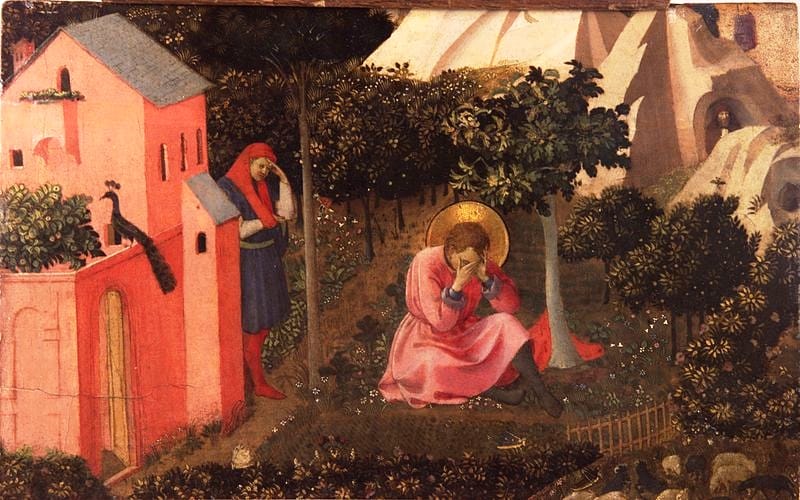When Our Lord teaches the disciples to pray the Our Father, He connects the forgiveness of sins with our capacity to forgive others. Just to make sure that the point was understood, it follows up the prayer by making it more explicit: “For if you forgive others their trespasses, your heavenly Father will also forgive you; but if you do not forgive others, neither will your Father forgive your trespasses” (Mt 6:14-15). This commandment is shocking, especially for those of us who assume that God’s forgiveness is unconditional as long as we are sorry for our own sins. Upon reflection however, to put such a restriction on forgiveness however, like all of Christ’s commandments, is for our good and it turns out that the necessity is more closely related to our capacity to receive forgiveness than to give it.
To grasp the meaning of the dictate then we must first reflect on forgiveness itself. When a person purposely does real harm to us in some way, we are “spiritually” wounded by that person. That is why we often say “I was hurt when you said/did X”. It is important to note that this is a perfectly natural reaction to a perceived injustice; a reaction that is accompanied by sorrow and sometimes even anger. In other words, to dismiss it as “nothing” is irrational. It is something and it has done something both to you and the offender that needs to be addressed for the good of both of you.
The Dangers of Unforgiveness
Only forgiveness can heal this wound. Unforgiveness allows the wound to fester meaning that the person is unable to turn away the suffering of the injury. Demons, keenly aware of the wound, will tempt the person to focus on the wrong in order for the wound to remain open and keep them trapped in a state of sorrow and anger. Because he dialogues with the Tempter, he slowly gains more and more control over the person especially concerning anything related to the wound. A stronghold is developing and forgiveness becomes even more difficult because the person is now beginning to identify himself as a victim.
This “victim” status now blocks him from receiving forgiveness from God. This is the point of the parable that Our Lord tells about the Unforgiving Servant later in Matthew’s gospel (Mt 18:21-35). The man is offered forgiveness but because he is so focused on the slights against him, he is unable to generate the sadness (or the gratitude for forgiveness) necessary for the Master forgiving him. Unforgiveness then makes it impossible for God to forgive us because all of our sorrow and anger is directed at the slights against us rather than at the wrongs we have done.
How to Forgive
Given how important forgiveness is for us then it is worth reflecting on how we can, as Our Lord commands “forgive your brother from your heart” (Mt 18:35). First, we make the distinction between what might be termed volitional forgiveness and emotional forgiveness. Because we are fallen and our emotions do not always follow our will, they are often separate acts. The easier of the two is volitional, especially because the demons cannot touch our will. To forgive in the will is to release the person from the debt of justice and turn them over to God so that He might deliver a just punishment. This can sound and feel like wishing for a smiting and so you should always pray that God forgives them as well. It is this latter step that provides the most healing for the one that has been offended. It is important to remember that Christ does not merely issue commandments but promises the grace to fulfill that commandment as well. It is important to always pray for the grace to have forgiveness in your heart.

Emotional forgiveness is often the harder of the two because we must break the association of the pain caused with the person. This is why it is always easier to forgive someone who apologizes. When he bears the burden of the sorrow he caused by expressing that sorrow, it lessens the burden on the offended person. This solidarity in sorrow also acts as a unitive force strengthening the communion between them. Love always means saying your sorry.
While it is easier when the offender expresses sorrow, it is not automatic. Nor is it, obviously, automatic when the offender shows no remorse. In that case, it often takes repeated acts of the will in order to bring the emotions in line with the will. Each time the thoughts drift towards the hurt, it is necessary for the offended to make the same act of the will until the emotion subsides. What will begin to emerge are feelings associated with mercy and compassion. This again is extremely difficult and is at the heart of Our Lord’s admonition to Peter that he must forgive his brother seventy times seven times. It may actually take 490 (or more) acts of the will to fully heal the emotional wound that has been inflicted.
In closing, it is important to reiterate the fact that “forgiveness is divine”. Christ never commands without equipping. Many times unforgiveness traps us in a web of guilt because we feel like we are powerless to forgive. The first step in the process, like in every process, is to ask for the grace to forgive, knowing that was one of the graces He won for you on Calvary when, in the face of those who weren’t sorry, He asked “Father, forgive them for they know not what they do.”



